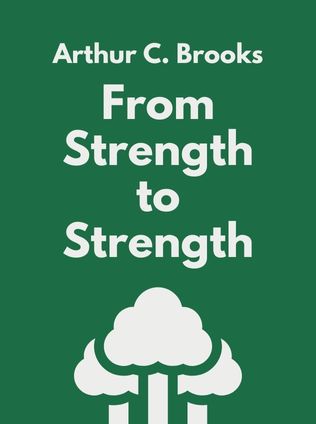
From Strength to Strength
Finding Success, Happiness, and Deep Purpose in the Second Half of Life
By Arthur C. Brooks
Published 02/2022
About the Author
Arthur C. Brooks is an esteemed social scientist, prolific author, and professor at Harvard University. Known for his insightful analysis of happiness, leadership, and social dynamics, Brooks has dedicated his career to understanding the factors that contribute to a fulfilling and purposeful life. His extensive research spans various disciplines, including economics, psychology, and public policy, providing a rich foundation for his writings. In "From Strength to Strength: Finding Success, Happiness, and Deep Purpose in the Second Half of Life," Brooks combines his academic expertise with practical advice to guide readers through the inevitable changes that come with aging.
Main Idea
"From Strength to Strength" addresses the natural decline in fluid intelligence that everyone experiences as they age and proposes a shift in focus towards crystallized intelligence. Brooks emphasizes the importance of embracing this transition to find continued success, happiness, and deep purpose in later life. He provides a roadmap for leveraging accumulated knowledge and wisdom to remain productive and fulfilled, rather than clinging to past achievements and the diminishing returns of youthful talents.
Table of Contents
- Introduction
- The Inevitable Decline
- The Second Curve
- Chipping Away
- Relationships
- Vanaprastha
- Conclusion
Introduction
Arthur C. Brooks opens his book with a compelling narrative about the struggles of highly accomplished individuals who find themselves unfulfilled as they age. Despite their success, they face an inevitable decline in cognitive abilities, leading to what Brooks calls the "striver’s curse." This curse manifests as a fear of irrelevance and a loss of purpose, driven by the realization that their peak performance years are behind them. Brooks introduces the concept of shifting from fluid intelligence, which involves quick thinking and problem-solving, to crystallized intelligence, which grows with age and is centered around accumulated knowledge and wisdom.
The Inevitable Decline
Brooks highlights the universal nature of cognitive decline, stating that "in practically every high-skill profession, decline sets in sometimes between one’s late thirties and early fifties." He uses examples from various fields, including Nobel Prize winners, to illustrate that significant discoveries and achievements often occur early in one's career, with a marked decline in later years. The prefrontal cortex, responsible for multitasking, memory, and executive functioning, is the last part of the brain to develop and the first to decline, explaining this phenomenon.
This decline, while inevitable, does not affect everyone equally. Those who have tied their identity to their professional achievements may suffer more acutely. Brooks quotes a study by Benjamin Jones, noting that "the chances of great discoveries increase in a person’s twenties and thirties and then decline dramatically through one’s forties, fifties, and sixties." He explains that the most accomplished individuals often face the greatest agony during their decline, as they have the most to lose in terms of prestige and self-esteem.
"The agony of decline is directly related to prestige previously achieved, and to one’s emotional attachment to that prestige." – Arthur C. Brooks
To illustrate this concept further, Brooks shares a poignant anecdote about a highly successful man he met on a plane. Despite his remarkable achievements, the man confided in Brooks that he felt his life would be better off if it ended. This revelation sparked Brooks's interest in understanding why such accomplished individuals often feel unfulfilled and dissatisfied as they age. He discovered that the relentless pursuit of success and the subsequent decline in professional abilities can lead to a profound sense of loss and irrelevance.
Brooks delves into the neuroscience behind this decline, explaining that the prefrontal cortex, responsible for higher-order cognitive functions, begins to deteriorate with age. This decline affects a person's ability to multitask, remember information, and perform complex problem-solving tasks. As a result, those who have built their identities around their professional achievements may find it increasingly difficult to maintain the same level of performance, leading to feelings of frustration and inadequacy.
Sign up for FREE and get access to 1,400+ books summaries.
You May Also Like
The Subtle Art of Not Giving a F*ck
A Counterintuitive Approach to Living a Good Life
By Mark MansonRich Dad Poor Dad
What the Rich Teach Their Kids About Money - That the Poor and Middle Class Do Not!
By Robert T. KiyosakiHow To Win Friends and Influence People
The All-Time Classic Manual Of People Skills
By Dale CarnegieFreakonomics
A Rogue Economist Explores the Hidden Side of Everything
By Steven D. Levitt and Stephen J. Dubner



















